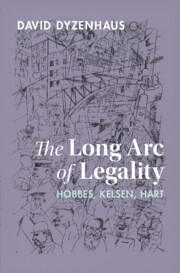103 results
Franz Neumann and Ernst Fraenkel on the Liberal Democratic Constitutional Project
- Part of
-
- Journal:
- AJIL Unbound / Volume 117 / 2023
- Published online by Cambridge University Press:
- 23 October 2023, pp. 269-273
-
- Article
-
- You have access
- Open access
- HTML
- Export citation
Appendix III - John Finnis and ‘Schmittean Logic’
-
- Book:
- The Long Arc of Legality
- Published online:
- 13 January 2022
- Print publication:
- 27 January 2022, pp 435-444
-
- Chapter
- Export citation
3 - The Constitution of Legal Authority / The Authority of Legal Constitutions
-
- Book:
- The Long Arc of Legality
- Published online:
- 13 January 2022
- Print publication:
- 27 January 2022, pp 149-223
-
- Chapter
- Export citation
Introduction
-
- Book:
- The Long Arc of Legality
- Published online:
- 13 January 2022
- Print publication:
- 27 January 2022, pp 1-40
-
- Chapter
- Export citation
Index
-
- Book:
- The Long Arc of Legality
- Published online:
- 13 January 2022
- Print publication:
- 27 January 2022, pp 467-476
-
- Chapter
- Export citation
2 - The Puzzle of Very Unjust Law II
-
- Book:
- The Long Arc of Legality
- Published online:
- 13 January 2022
- Print publication:
- 27 January 2022, pp 88-148
-
- Chapter
- Export citation
Dedication
-
- Book:
- The Long Arc of Legality
- Published online:
- 13 January 2022
- Print publication:
- 27 January 2022, pp v-vi
-
- Chapter
- Export citation
Copyright page
-
- Book:
- The Long Arc of Legality
- Published online:
- 13 January 2022
- Print publication:
- 27 January 2022, pp iv-iv
-
- Chapter
- Export citation
5 - The Politics of Legal Space
-
- Book:
- The Long Arc of Legality
- Published online:
- 13 January 2022
- Print publication:
- 27 January 2022, pp 297-351
-
- Chapter
- Export citation
Contents
-
- Book:
- The Long Arc of Legality
- Published online:
- 13 January 2022
- Print publication:
- 27 January 2022, pp vii-viii
-
- Chapter
- Export citation
Appendix II - Kantian Private Law Theory
-
- Book:
- The Long Arc of Legality
- Published online:
- 13 January 2022
- Print publication:
- 27 January 2022, pp 431-434
-
- Chapter
- Export citation
Appendix I - Exclusive and Inclusive Legal Positivism
-
- Book:
- The Long Arc of Legality
- Published online:
- 13 January 2022
- Print publication:
- 27 January 2022, pp 423-430
-
- Chapter
- Export citation
Appendices
-
- Book:
- The Long Arc of Legality
- Published online:
- 13 January 2022
- Print publication:
- 27 January 2022, pp 423-444
-
- Chapter
- Export citation
4 - The Janus-Faced Constitution
-
- Book:
- The Long Arc of Legality
- Published online:
- 13 January 2022
- Print publication:
- 27 January 2022, pp 224-296
-
- Chapter
- Export citation
6 - Legality’s Promise
-
- Book:
- The Long Arc of Legality
- Published online:
- 13 January 2022
- Print publication:
- 27 January 2022, pp 352-422
-
- Chapter
- Export citation
Bibliography
-
- Book:
- The Long Arc of Legality
- Published online:
- 13 January 2022
- Print publication:
- 27 January 2022, pp 445-466
-
- Chapter
- Export citation
Preface
-
- Book:
- The Long Arc of Legality
- Published online:
- 13 January 2022
- Print publication:
- 27 January 2022, pp ix-xiv
-
- Chapter
- Export citation
1 - The Puzzle of Very Unjust Law I
-
- Book:
- The Long Arc of Legality
- Published online:
- 13 January 2022
- Print publication:
- 27 January 2022, pp 41-87
-
- Chapter
- Export citation

The Long Arc of Legality
- Hobbes, Kelsen, Hart
-
- Published online:
- 13 January 2022
- Print publication:
- 27 January 2022
4 - Elective Dictatorship
-
- Book:
- Courting Constitutionalism
- Published online:
- 16 December 2021
- Print publication:
- 16 December 2021, pp 84-107
-
- Chapter
- Export citation



